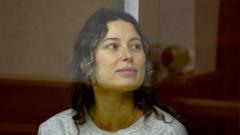This website uses cookies so that we can provide you with the best user experience possible. Cookie information is stored in your browser and performs functions such as recognising you when you return to our website and helping our team to understand which sections of the website you find most interesting and useful.


A Russian court has sentenced amateur ballerina Ksenia Karelina to 12 years in jail for treason for donating $51 (£39) to a charity supporting Ukraine.
Karelina, who has American and Russian citizenship, pleaded guilty last week after a trial held behind closed doors.
She had been living in Los Angeles and became a US citizen in 2021. She was arrested during a family visit last January in Yekaterinburg, about 1,600km (1,000 miles) east of Moscow.
Prosecutors had sought a 15-year jail term. The court in Yekaterinburg found her guilty of high treason and sentenced her to imprisonment in a general regime penal colony.
Karelina had been accused by Russia's FSB security service of raising money for a Ukrainian organisation providing arms to the Ukrainian military.
Russian human rights activists said while living in the US she had made a single transfer of $51.80 on the first day of Russia's full-scale invasion of Ukraine on 22 February 2022. The FSB is thought to have discovered the transaction on her phone.
Her lawyer, Mikhail Mushailov, said Karelina had only admitted transferring the money and believed the funds would help victims on both sides. He told Russian media she would appeal against the sentence.
The charity, Razom for Ukraine, said earlier this year it was "appalled" to hear of the amateur ballerina's arrest and denied raising money for weapons or ammunition. It said it was a US-founded charity focused on humanitarian aid and disaster relief.
Karelina went on trial in June in the same court as Evan Gershkovich, the Wall Street Journal reporter who was jailed for espionage but freed earlier this month as part of a major prisoner swap with the US and other Western countries.
The cases in Yekaterinburg were heard by the same judge, Andrei Mineev.
Ksenia Karelina's boyfriend, boxer Chris van Heerden, said on Thursday that he was very angry with the situation.
"I woke up to the news this morning. I'm still sitting here processing what's happening," he told CBS News, the BBC's media partner.
"There was a prisoner swap two weeks ago, and Ksenia was not on that list," he said, adding that he had been pushing for her to be sent home for the past eight months.
"Ksenia should be home, and I'm angry, and I'm trying to hold my composure."
Since the start of Russia's full-scale invasion of Ukraine in February 2022, Russia's authorities have clamped down on dissent and human rights groups say more than 1,000 criminal cases have been opened against anti-war dissidents.
Last year President Vladimir Putin signed a decree formally increasing the maximum jail term for treason from 20 years to life. A record number of treason cases were opened last year, according to human rights activists.
In July, dual German-Russian teenager Kevin Lik was given four years for treason. He was one of the 16 men and women freed by Russia as part of its prisoner exchange with the West.
When Karelina was first detained, rights group Perviy Otdel said she had been accused of swearing in a public place. But her initial detention for "petty hooliganism" was then extended when the FSB accused her of treason.
She had been working at a hotel spa in Beverly Hills before her arrest and had travelled to Yekaterinburg to see her parents and her elderly grandmother.
Karelina is her maiden name, and she is also known as Ksenia Khavana because she took her ex-husband's surname.



 Africana55 Radio
Africana55 Radio 
